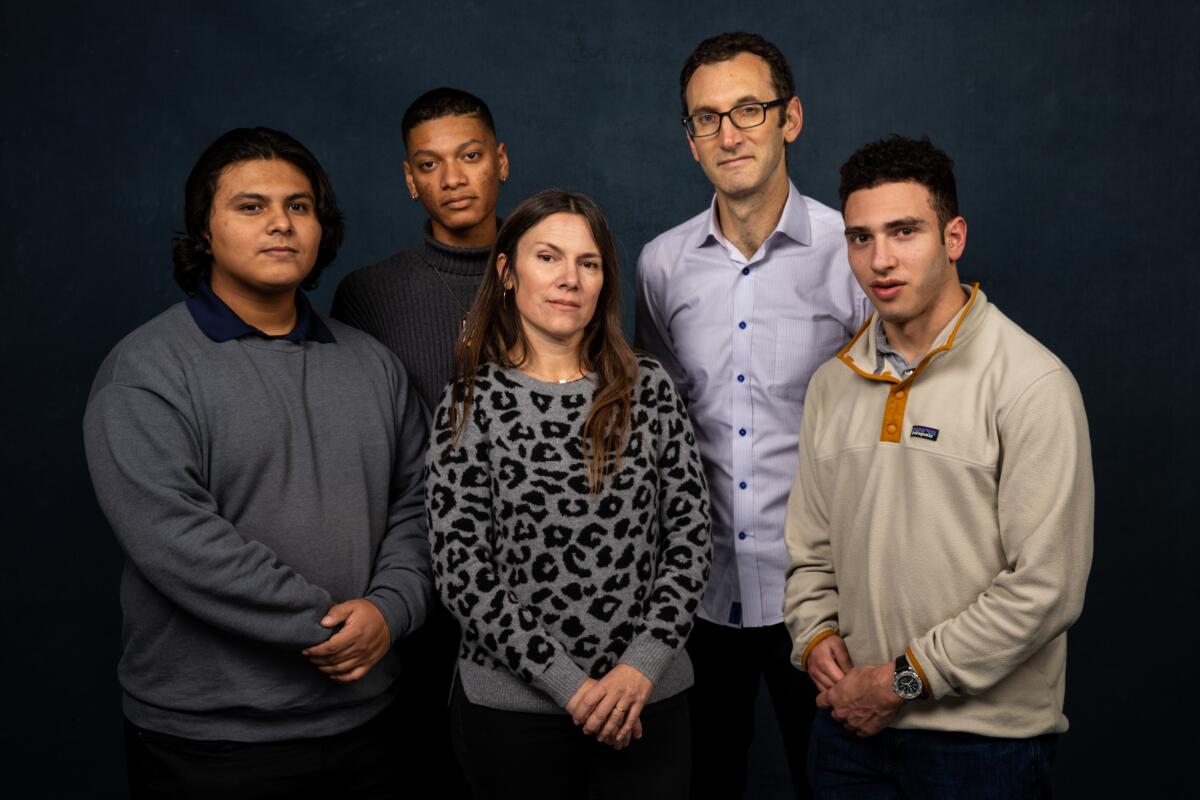‘Boys State’ examines the challenges to democracy through the eyes of young men
- Share via
When longtime husband-and-wife documentary filmmakers Amanda McBaine and Jesse Moss learned of the American Legion Boys State mock-government program, in which teenagers explore political discourse in the U.S., they knew they had their next film.
“Boys State” follows four Texas teens — René Otero, Ben Feinstein, Steven Garza and Robert MacDougall — at that state’s gathering in summer 2018. The documentary won the 2020 Sundance film festival’s grand jury prize, screened on Capitol Hill and was sold to A24 and Apple TV+ for $12 million.
“To us, the stakes for it were — and are — really high,” says McBaine. “Democracy, the things we had taken for granted, the under-pillars of our system of government felt under assault. So we framed [the film] with this set of questions about the existential threat to democracy. It hit its timing well.”
Your idea for the documentary came in 2017 after the Texas Boys State voted to secede from the U.S.
Jesse Moss: I don’t think any Boys or Girls State legislative body in its 80 years had ever voted to secede before. Amanda and I were still processing the 2016 election and the political divisions in our country and as filmmakers were looking for a way to confront these divisions. There was something kind of absurd and playful about that [secession] vote, but also deadly serious. This space of having young people with different politics actually trying to talk to each other and find common ground is what really drew us to go down to Texas.
Amanda McBaine: Also, it offered a sideways approach to think about these large questions and challenges to democracy. If they voted to secede in 2017, what’s the next step? Is it going to be full civil war or are we going to figure out a way to talk to one another? This offered a way to think about the questions but also see a story about young people and how they’re forming.
From a potential cast of more than a thousand young men, how did you settle on the handful you showcased?
Moss: We jumped into the [program’s] selection process as a way of auditioning who should be in the film. It was just legwork. We wanted a diversity of backgrounds, ethnicities and politics and so spent three months in Texas with a skeleton crew and traveled from little cow towns to big cities and met so many boys; we interviewed hundreds. We asked: How do you feel about the divisions in our country? How they responded to that very open-ended question told us a lot about how seriously they took the moment, themselves, their engagement with politics.
My favorite line in the film is from Black teen René Otero: “I’ve never seen so many white people, ever.” Were you concerned that Boys State is skewed white and politically to the right?
Moss: We think of Texas Boys State like the U.S. Senate, since it does skew white and conservative and rural. It’s a metaphor for the state of our country: disenfranchised boys who come to power and who are fighting for power. Steven and René try to find their own voice while navigating this kind of space, and inside this forum, it can stand out and showcase powerfully. That’s what made the journey for us so ultimately hopeful.
The program can appear to facilitate a kind of Etonian, high-testosterone mixture of sports, bullying and other male domination themes. Is this an anachronism in 2020?
McBaine: There is something old fashioned to this program, though they’re trying hard to draw kids from all places and who represent the actual demographics of Texas.
Moss: But that’s also our country. So as a representation of a system, it’s not what we want to live with, but it’s what we have to deal with. The U.S. Senate is like a 1950s space. We have better representation now, but we’re not there yet.

What about the separation of Boys State and its sister program, Girls State?
Moss: We did hear from the leadership of Texas Boys State and they’re forward-thinking guys. I think if a girl applied to Texas Boys State and she was qualified, they’d let her in. So it may just be a matter of time. Still, there was a real value in entering an all-male space because you see clearly the collision of two different ways of being a young man. Compassionate, empathetic, listening, compromising but also the more aggressive politics of strength with military and sports metaphors like “combine our armed warfare” and “we need to dominate.”
How surprised were you at the reception of “Boys State”?
McBaine: For me, every film you make, you simultaneously think it’s amazing and also have doubts. But I’m also not surprised our film resonated with people this year, as all of us are conscious of the so-called cold civil war we’ve had go on.
Moss: The value for us is it wasn’t about Donald Trump; we need to find other ways of talking about what’s wrong with our country. Hopefully, it’s a story and a conversation we can carry with us because we know these divisions have not been put aside or put to rest with the 2020 election as much as we’d hoped; we’re really living with them, trying to find creative ways to confront them.
More to Read
From the Oscars to the Emmys.
Get the Envelope newsletter for exclusive awards season coverage, behind-the-scenes stories from the Envelope podcast and columnist Glenn Whipp’s must-read analysis.
You may occasionally receive promotional content from the Los Angeles Times.










